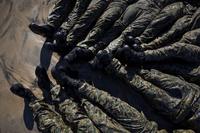The state commission investigating the Lewiston mass shooting finally succeeded in interviewing an Army social worker, but Thursday's hearing quickly revealed that she had little to nothing to do with the case.
Patricia Moloney, a contracted civilian medical professional who helps run the Army Reserve's psychological health program, told the commission she received a call about Robert Card shortly after his hospitalization last July. However. because a different team member was already assigned to Card's case, Moloney was not responsible for following up.
"I stepped back," she said during a brief virtual hearing. "There was nothing more for me to do."
Less than two months after Card was released from the hospital, he killed 18 people and wounded 13 others in the state's deadliest mass shooting. His friends and family have said he thought people at the two businesses he targeted had been talking about him, calling him a pedophile.
Thursday's meeting, which commission members agreed to cut short after they realized Moloney would not be able to speak to the case, exemplified the commission's struggle not only to get answers about the Army's handling of Card but to even figure out where to look.
After Moloney failed to appear at a public hearing last week, commission Executive Director Anne Jordan laid out the group's monthlong effort to question her. Commission staff used Army contacts and employees of the civilian health companies they contract with to identify the right person to talk to, she said. After a few wrong turns, they were pointed in Moloney's direction.
But even after commissioners issued a subpoena, they struggled to reach Moloney or her attorney and never received confirmation that she would appear. Moloney said Thursday that she did not receive the subpoena.
She told the commission that she did get a phone call last July about Card from Jason Rogers, the suicide prevention manager for Card's unit. Card's commanders had just ordered him to submit to an evaluation at a psychiatric hospital in New York after months of paranoid behavior culminated in the reservist attempting to fight a fellow soldier.
In cases like these, the Army's psychological health program helps connect reservists and their commanders with the appropriate mental health resources and follow-up, Moloney said. But after checking with her boss, Stacey Feig, Moloney said she learned that Card's case had already been assigned to Cari Sanford, a nurse case manager.
If Card proved uncooperative about follow-up treatment, Sanford would have informed Feig, Moloney said. But Moloney wouldn't have had anything to do with it.
Friends and relatives have told the commission that Card was unhappy with his two-week stay at Four Winds psychiatric hospital last July and that upon his release he quickly went off the medication he was given. His unit commander, Capt. Jeremy Reamer did not monitor his follow-up care or take steps to confiscate the many guns Card kept at home even though an Army nurse practitioner recommended he do both.
Card continued to isolate himself from friends, family and his unit in the weeks before the mass shooting.
Another member of the psychological health program told the commission last month that while Robert Card's Army Reserve superiors did not necessarily have to follow the same protocol for follow-up care as those who supervise active-duty military personnel, they ultimately were responsible for ensuring that he was being treated properly.
The findings of both the Army's internal review of its handling of Card and the commission's final report are expected to be released this summer.
This story is part of an ongoing collaboration with FRONTLINE ( PBS) and Maine Public that includes an upcoming documentary. It is supported through FRONTLINE's Local Journalism Initiative, which is funded by the John S. and James L. Knight Foundation.
___
(c)2024 the Portland Press Herald (Portland, Maine)
Visit the Portland Press Herald (Portland, Maine) at www.pressherald.com
Distributed by Tribune Content Agency, LLC.












